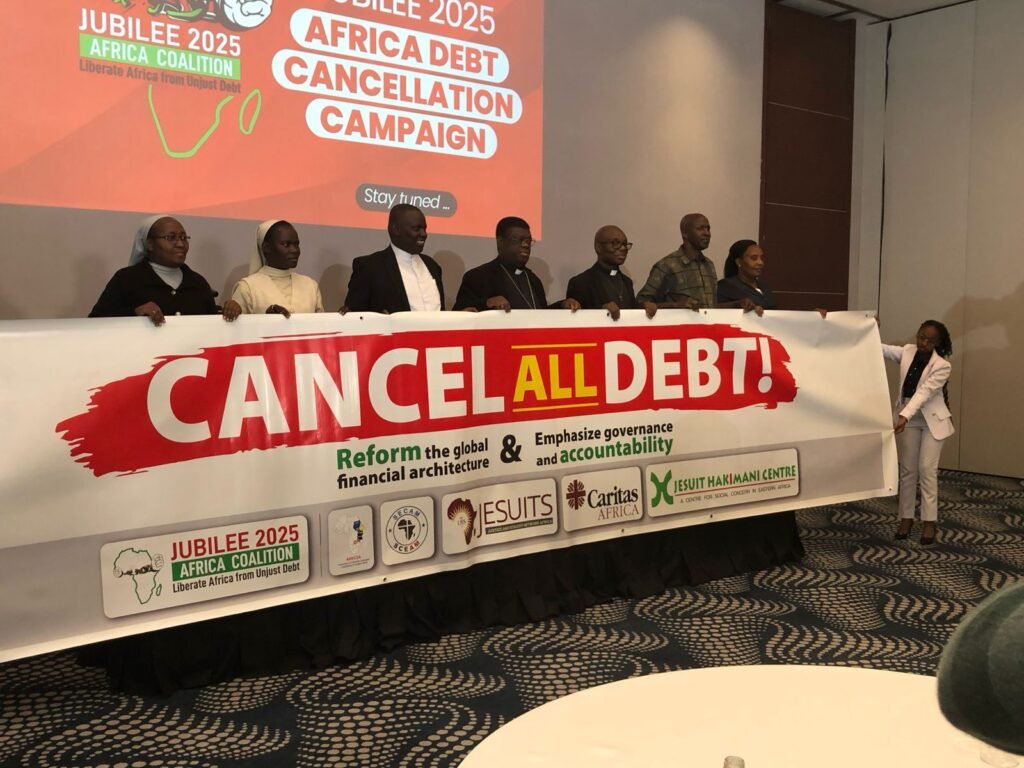Kenya and most African countries are currently at a critical juncture as they grapple with a mounting debt crisis that threatens to undermine their economic stability and development prospects.
As a result, the Catholic Church, through the Association of Member Episcopal Conferences in Eastern Africa (AMECEA), has entered into a partnership with the Jesuit Justice and Ecology Network Africa (JENA), Caritas Africa, and the Symposium of Episcopal Conferences of Africa and Madagascar (SECAM), to launch the Jubilee 2025 Debt Cancellation Campaign in Nairobi.
This initiative, which is inspired by Pope Francis’s call for a Jubilee Year, seeks to mobilize action across Africa for the cancellation of unjust debts and advocate for comprehensive reforms in the global financial system. With Kenya’s public debt already exceeding Sh ($80 billion) —equivalent to over 70% of its GDP—the country is teetering on the edge of fiscal distress.
The burden of debt servicing has become overwhelming, consuming more than 60% of government revenue. This leaves little room for essential investments in healthcare, education, and infrastructure, sectors that are vital for the nation’s progress and the well-being of its citizens.
In fact the healthcare system is under immense strain, with public hospitals facing critical shortages of medical supplies and equipment. Out-of-pocket expenses for healthcare are rising, placing an additional burden on the most vulnerable populations.
Meanwhile, cuts in education funding are jeopardizing the future of millions of children as public institutions are struggling with reduced budgets, leading to overcrowded classrooms and soaring tuition fees.
The ripple effects of this financial crisis are felt across the economy, as the Kenyan shilling continues to depreciate and inflation escalates, further eroding the purchasing power of ordinary citizens.
Furthermore, the high cost of debt servicing is forcing the government to implement austerity measures that threaten vital social welfare programs. These measures, while aimed at stabilizing the economy, risk exacerbating poverty and inequality.
With pressure from international lenders for fiscal discipline increasing, Kenya, like most other African countries, finds itself in a dire position. Henceforth, the church and its partners have started this campaign calling for periodic debt forgiveness and the restoration of economic equilibrium.
The Church’s vision for Jubilee 2025 is to see Kenya and Africa as a whole, liberated from the constraints of unjust debt, thriving within a fair global financial system, and strengthened by ethical leadership and robust governance.
The Jubilee 2025 Debt Cancellation Campaign looks to generally address the systemic flaws in the global financial architecture that perpetuate cycles of debt entrapment. The campaign advocates for responsible borrowing and lending practices that uphold justice and equity.
It also calls for meaningful debt restructuring negotiations to lighten the repayment burden and ensure that future generations are not shackled by unsustainable debt.
With over 22 African countries either in debt distress or at high risk, exacerbated by the COVID-19 pandemic and global economic shocks, the campaign highlights how these debts, often incurred under unfair conditions, perpetuate inequality and hinder sustainable development.
The aim is to secure the cancellation of unjust debts, promote reforms in the global financial system, and raise awareness about the moral and ethical dimensions of debt through education, media engagement, and grassroots campaigns.
This launch acts a powerful reminder of the need for global solidarity in addressing the debt crisis. The campaign builds on the legacy of the Jubilee 2000 Campaign, which achieved significant victories, including the cancellation of over Sh ($100 billion) in debt for some of the world’s poorest countries.
This debt relief enabled nations to invest in critical sectors such as health, education, and infrastructure, dramatically improving the lives of millions.
This campaign, which serves as a beacon of hope, is a call to action for governments, civil society, and the international community to come together and address the root causes of the debt crisis. By advocating for debt relief and financial reforms, African nations will in turn be empowered to invest in their future and ensure that the most vulnerable are protected. For Kenya, this move represents an opportunity to break free from the shackles of debt and chart a new course towards sustainable development and economic resilience.


